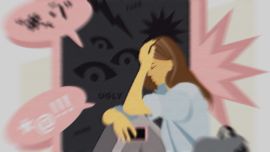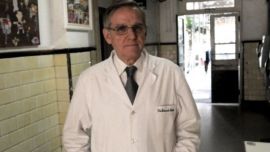Once Cristina Fernández de Kirchner's 2007 running-mate and today a sitting senator for the opposition coalition, Julio Cobos describes the situation within both electoral fronts, highlighting the role of progressives in Juntos por el Cambio.
Cobos demands protagonism from moderates, arguing that their predominance offers better chances for the upcoming midterms.
As for the ruling coalition, he thinks that the strategy of “impossible without Cristina while Cristina alone is not enough” has lost ground, because Alberto Fernández has not fully occupied the position assigned to him.
Do you still think that the grieta rift was born in the small hours of that July day in 2008, with your “not positive” vote against the export duties of Resolution 125?
Yes, the country had not been so divided. Even if there were always confrontations between Peronists and Radicals, they were more concentrated and contained within the political parties, not the citizenry.
The grieta chasm goes beyond the differences between political parties to expand into society at large. There and then Argentina began to split up and we still have not managed to get over it. Nor has there been much effort from the political sphere to try and heal the wounds – the speculation is rather that it suits them to keep the grieta going.
We’re a long way from finding the right framework for the necessary political consensus. After our last year it seems to me that people are starting to feel the need to calm down.
Was the Resolution 125 moment cause or consequence? Was it the epicentre of something coming from both above and below?
Néstor Kirchner marked a style of government to boost his authority. We had been coming out of a very weak democracy following the fall of Fernando de la Rúa amid a “begone with them all” mood against politicians. His form of consolidating power was finding the right adversary but this catalysed and expanded that social phenomenon which reached its height in the conflict against the farming sector. Then it was expressed and maintained at other levels of society. The rural issue persists to this day with the latest measures of the government as that old conflict continues to flicker. It seems that Kirchnerism cannot get over it.
You were part of Cristina Fernández de Kirchner’s presidential ticket and then your party joined Mauricio Macri in Cambiemos. What balance do you make of these last 15 years?
The Radicals have got over their errors and misunderstandings. It is true that most Radicals, above all those in office [the provincial governors and most mayors], adhered to that process of “concertation,” perhaps yearning to fulfil that objective of the frustrated Alliance between the Radicals and the Frepaso splinter of Peronism. All joined except then-Chaco governor Roy Nikisch. What was missing was an institutional interparty agreement.
Even if the parties were not very organised, they had gone to the elections as if they were PASO primaries with the Peronists fielding different candidates. We Radicals were not organised that way but we learned because we are a more institutional party. In the second stage, in the second electoral agreement, there were two postures. There was a party convention and our side lost but we fell in line and played our part in boosting that electoral option. That was our experience in both coalitions.
With Néstor and Cristina and also Mauricio Macri. It seems contradictory.
Kirchnerism and Peronism are pretty broad concepts. Our bet was on the Frente Amplio UNEN, a broad front teaming up the socialists, the parties of Fernando Pino Solanas and Margarita Stolbizer and the Radicals.
Radicalism is a party spanning from the middle to the centre-left and it was more feasible to reach agreement with PRO from the centre. We had some burning arguments but we decided to back whatever the convention resolved. Then we maintained our stance, trying to control the incorrect. We marked our differences with the decisions of some ministries or President Macri himself.
Is PRO shifting towards the right and could that make progressive Radicals such as yourself uncomfortable?
Beyond the postures of certain leaders, we are seeing a PRO with more radical and highly defined stances, aggressive as an opposition at times. There is another side of PRO which seeks a broad consensus, as we discussed at the time. Those two shades, the hawks and the doves, will be transmitted by the electoral process, bringing complications to that potential leader which is [City Mayor] Horacio Rodríguez Larreta. That’s the case, for example, with Patricia Bullrich and María Eugenia Vidal who have apparently decided to compete in the same district.
With which of those two do you feel most identified?
With Vidal and with Horacio Rodríguez Larreta and also with what [former Interior minister] Rogelio Frigerio represented. Along those lines but within the Radical party.
San Isidro Mayor Gustavo Posse, who competed in the Radical primaries, said that his party had been servile to PRO during the Cambiemos government. Do you agree with such a strong definition?
It was not a coalition government but a parliamentary alliance. The Radical representation in the government team did not meet the expectations of everybody. The persons appointed by Macri were those close to him, not those proposed by the Radical party. That’s the way it goes. PRO won the primary and we had to accompany them. Afterwards differences might have arisen but in general lines it was the government risking its skin, even it might consult and aim at consensus. In a primary you go looking for excuses to mark out differences but in any coalition, the winner takes the lead. The experience should serve us to see on what terms we celebrate electoral agreements, especially looking ahead to 2023.
You have stressed that in Juntos por el Cambio there is one wing of hawks more to the right and another more progressive wing. A conservative sector and a progressive wing are both historic in Argentina. The government alliance links traditional Peronism with Kirchnerism so that in reality there are two coalitions and four tendencies. According to the European model, there would directly be four parties forming different legislative alliances. But under presidential democracy it is necessary for the alliances to precede the election in order to construct a kind of two-party system. Can those alliances be broken? Would there be any benefit?
The differences which you single out exit. In the case of Frente de Todos, the political leadership is exercised by Kirchnerism. We are more horizontal because PRO is not in government. I have always maintained that a strong opposition is good for any government, controlling it and requiring more. Constituting a future alternative generates something healthy. We will each make that analysis of whether to continue or not, despite the tensions. We will try and sort them out internally, that’s what the primaries are for. I don’t see the possibility of a rift in either Frente de Todos or Juntos por el Cambio. In our case it’s more difficult to stay united.
Is it necessary for the moderate sector of PRO to show they’re in charge?
Maybe that’s also part of the primary process. Let’s see how Buenos Aires Province and the Federal Capital work out. Other leaderships are emerging alongside ex-president Macri, like Horacio Rodríguez Larreta and María Eugenia Vidal, who has also expressed presidential aspirations. It will all come out in the wash in the next electoral scenario.
The City Mayor has to show his strength as a candidate in his own right. He’s very conciliatory – when he isn’t yielding ground to[ Elisa] ‘Lilita’ Carrió, he’s giving it to [Radical Senator] Martín Lousteau. If he aspires to the presidency, he will need his own people to represent him in the Senate and Congress in the Federal Capital elections. And in Buenos Aires Province he will also have to begin to show a certain clout, whether with [Deputy Mayor] Diego Santilli or with other people accompanying him, in order to start branching out and constructing power beyond the limits of the Federal Capital.
[Congress Speaker] Sergio Massa used to say that Kirchnerism had to be beaten within the Peronist primary. He couldn’t pull it off and thus ended up within the ruling coalition of Kirchnerism. From within Juntos por el Cambio they affirm that the only way to turn the page on the failure of Macri’s government is by beating his candidates. Is that what you were referring to?
Yes, running one’s own candidates. If Bullrich is the candidate of Macri and that makes the City Mayor uncomfortable, then he should present his own candidates. Bar a miracle, it seems to me that this will be irreversible in the electoral processes of the Federal Capital and Buenos Aires Province. The rest is vaguer – Córdoba is a completely different chapter. In Radical-ruled provinces, the governor calls the shots. The mayor is placing plenty on the line. We’re waiting to see what happens with certain leaderships which could emerge, cutting the umbilical cord.
Will Horacio Rodríguez Larreta’s candidates win the primary? What will happen in November?
Horacio will take different decisions this time. If Bullrich runs, he must present his own candidate, namely María Eugenia Vidal, who until now seems to me to wish to return to her origins as the elected deputy mayor of ex-president Macri. And I think that Horacio Rodríguez Larreta is going to win because the midterms also imply a ratification of his course. It seems to me that he has managed complicated times well – with balance, with respect and also firmness when it corresponded. What you are looking for in any political leader. He will consolidate his leadership.
And for Buenos Aires there are many candidates very close to him like Diego Santilli or [ex-Speaker] Emilio Monzó, who is not so close to María Eugenia Vidal but to Frigerio and thus Horacio Rodríguez Larreta. Everything could come together to reach a rapid agreement with the Radicals, who have brilliant leaders like Facundo Manes worth taking advantage of. Let’s see if there is a single list with Radicals, PRO people and others.
Will Juntos por el Cambio be competitive despite defeat the last time?
Perhaps Buenos Aires Province is the most difficult district, who’s governing in Greater Buenos Aires always carries a lot of weight. But I don’t see it as impossible. I asked María Eugenia Vidal and she’s convinced. Juntos por el Cambio can try and nationalise this election, perhaps with some leaders still awaiting recognition. In this case those in government have a handicap in favour. I see a very even scenario with a technical tie awaiting final definition in the last days.
Given the last result, a tie in BA Province would be a triumph.
Even a good election can be transmitted or perceived as a triumph of moderation while you can win by one vote. But elections give us the possibility of being a future alternative. The electoral weight of Buenos Aires Province defines plenty.
Will a national team of candidates be presented in your native Mendoza?
We’ve been talking to Governor Rodolfo Suárez. That’s the idea. This week we advanced with the modification of the PASO primaries. The governor’s idea is to shoot for the best election possible. He’s also risking his skin as a well-placed governor projecting nationally. He has the typical profile of a man from Mendoza – nothing strident but tenacious and persevering. He’s gone down well among the electorate and people support him. We’ll decide with every angle of our party to arrive at a single list while also including our allies, PRO, the Democratic Party [Mendoza’s traditional conservatives] and the socialists, an unprecedented alliance. When I ran for governor, we had the Justicialist Party but the Democrats ran apart, as did the socialists. The greater amalgam benefits us all electorally because it’s us versus Frente de Todos.
You said “typical of Mendoza, nothing strident.” Are the chances of Juntos por el Cambio increased by Mendoza’s Peronists being headed by Senator Anabel Fernández Sagasti, who is just as strident as the vice-president?
To be fair, she’s a young leader who has come to represent Frente de Todos by her own merit after competing in the primaries against a traditional Peronist gubernatorial hopeful, Maipú Mayor Alejandro Bermejo. She won, which gives her the epaulettes to lead the opposition party. But the figure of Cristina Kirchner does not go down well these days in Mendoza. By constantly sticking so close to her figure, the senator weakens her position, nationalising the election due to that degree of affinity. Something which benefits us because Córdoba and Mendoza are where Cristina has the worst image.
Why is Cristina Fernández de Kirchner most rejected in the central provinces? Is there an economic explanation?
It’s that way in all the central provinces, except perhaps San Luis. Now they play along but San Luis Peronism used to oppose Kirchnerism, at least when I was vice-president. The Peronism of Santa Fe has nothing in common with Kirchnerism. It’s part of reality that Central Argentina does not want anything to do with Kirchnerism. As you go north, Kirchnerism begins to gain protagonism, as it does when you go south, where it originated.
Buenos Aires Province has two names highly linked to CFK, [Governor] Axel Kicillof and Máximo Kirchner. Will the formula of “impossible without Cristina while Cristina alone is not enough” continue into 2023 with the winning candidate somebody more distanced from classic Kirchnerism?
Greater Buenos Aires is the place where Kirchnerism finds the most acceptance. The scenario of Buenos Aires Province is different and also contributes a lot. All things being equal, the best scenario for Frente de Todos would be running a non-Kirchnerite candidate.
I don’t know if Alberto Fernández has what it takes for a second term. If not, they will have to seek out one of their governors who is well-positioned and does not form part of Kirchnerism. They can refloat the momentum Cristina once had alongside the acceptance of a figure like Alberto Fernández covering a bit more ground than hard-core Kirchnerism.
It’s also a question of survival for Frente de Todos. They will do what best suits them but always together. Every bid outside the Front, such as by Florencio Randazzo who is now again making a very great effort, has obtained very meagre results in BA Province. These days they’ve picked up a bit but to me it seems insufficient for an electoral strategy with possibilities of triumph.
Will society believe in the moderation of a candidate from that sector, given the experience of government under such a strong figure as CFK?
After that conflict with the farming sector, which was not fixed by that Senate vote of mid-2008 but deepened until its defeat in the 2009 midterms with a list lining up Néstor Kirchner, Daniel Scioli and Sergio Massa all together and then [in 2011] Cristina won with 54 percent of the vote.
We’ll have to see. A lot depends on economic recovery. No possibility should be ruled out. We’re hoping that the election results are according to what is happening now. In theory the electorate should be shifting towards the opposition to establish control but I rule nothing out. They have a hard core of voters. Both in the north and the south, according to the opinion polls, the acceptance of the government is great, except in Chubut, Tierra del Fuego and Santa Cruz. And in the north [Santiago del Estero, Tucumán and Misiones] the acceptance is very strong.
As time goes by, has the La Cámpora youth shifted more to the centre? How do you compare Kirchnerism then and now over the last 12 years?
Kirchnerism arose as a progressive movement within traditional Peronism, the version of Chacho Álvarez when he confronted the traditional party structure to form Frepaso. But their form of wielding power and some very striking cases of corruption blurred that idealism and the bid of the Concertation government to reach major agreements.
The years are showing things in a different light. La Cámpora has perhaps matured somewhat while being a bit more tolerant but there are still traces of their original identity while they face an uphill task in being perceived as anything different by the society which knew them back then. They might still find favour among the young.
Why did you use that phrase “not positive” in 2008?
It arose in a second. I had a philosopher professor Aranda in my secondary school, the Liceo Militar, to whom I liked to listen to. I never liked it when the bell rang to mark the end of class. Part of the material was logic. We asked him what was the point of studying it. He explained to us, for example, that it was useful for computer science. That awakened great interest in me.
It was not something thought out or suggested. It was the tensest moment in my life and one says what one feels at times like that. Perhaps in having to vote against while being the vice-president, I found the easiest way to express it. It occurred to me in an instant, a second before voting.
Is Alberto Fernández a transitional president?
We live in transition, in emergency, always at the limit. Alberto Fernández has lost an opportunity. I don’t know if he can recover his leadership in time. As Cabinet chief he gave orders with a delegated power.
I imagined an Alberto Fernández with power of his own, perhaps redeeming his feeling of original sin. He would have had to exercise power differently when Cabinet chief. That is what we were all expecting.
People want a strong president, not conditioned. A president who is not removed from reality and with a capacity for consensus but with his own imprint for showing the way.
Is it possible that after the elections that Alberto Fernández will reappear in his last two years with his place in history at stake?
That will depend on the electoral result and the lists. If the lists end up being defined by the purest Kirchnerism, Cristina and her allies, and win, he won’t have much going for him and it will be very much a transitional government. There are two paths ahead. If he participates in drawing up the lists and achieves a favourable result, he will be empowered again. And if he doesn’t and Kirchnerism loses, that should give him some oxygen too.
Perhaps he can recover his image. This is a very presidential democracy. Society wants a strong president who leads, who defines the path ahead, who listens, takes decisions and does not expect so much from those accompanying him.


















Comments